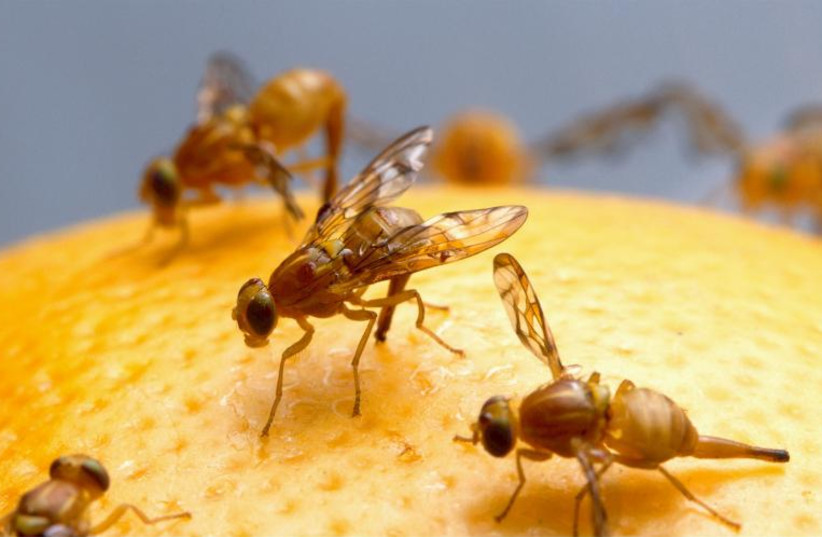In the painting “The Fly Catcher” by Isabelle Pinson (1769-1855) a young man in aristocratic dress ignores his studies as a fly on the window distracts him. His closed books and a stranded pen lie on the windowsill next to another fly trapped under a glass. The fly occupies very little space in the painting, yet our eyes, like his, are automatically drawn to it.
This imagery is redolent of the verse in Kohelet (Ecclesiastes) that helps us understand how a small irritant can preoccupy us. “Dead flies,” we read in the opening verse of chapter 10, “spoil and ruin the perfumer’s ointment; so, too, a little folly outweighs massive wisdom.”
The second clause of the verse is self-evident. Today, the social media universe serves up daily examples of wise people who hurt themselves and others with a foolish text, tweet, or post. There must have been ancient equivalents.
But it’s the first part of the clause that is particularly intriguing. A fly in the ointment has become common parlance for our human tendency to hyper-focus on a trivial problem and lose a more expansive perspective of goodness and gratitude.
We do this all the time.

Little mistakes spoil our days
We see a crack in the ceiling, and it spoils our intake of an otherwise beautiful room. More importantly, we find fault with something small that a friend, spouse, or child does or says and cannot situate it within a larger context of love, respect, or affection. An insignificant comment becomes a recipe for an argument. We look in the mirror and find that one minor defect – a pimple, a stain on a shirt, or a hair out of place – that can make our inner critic work overtime. Maybe we’re just hard-wired to be critical.
The sage Ben Azzai, however, questioned the verse’s supposition: “Does not one dead fly spoil perfumer’s oil? Would one sin spoil all the merits one had?” (Kiddushin 1:9, Jerusalem Talmud). Well, the thin, ugly wings and legs of a dead fly may very well spoil an otherwise costly and sweet-smelling ointment, or at least the user’s experience of it. It’s not hard to imagine the owner of a perfume throwing it away, disgusted by the iridescent black insect legs sticking out of a pricey unguent.
Rashi explains that dead flies do make a metabolic change in the composition of the perfume: “So an insignificant thing spoiled a precious thing.” For Rashi, the unfortunate fly did ruin the ointment. Robert Gordis, in his book Koheleth – The Man and His World agrees: “Dying flies have little power to accomplish anything, yet they can destroy the oil…” Something absolutely powerless can, nevertheless, destroy something of value.
I appreciated these observations until I read one sentence in Michael Fox’s outstanding commentary A Time to Tear Down and a Time to Build Up: A Rereading of Ecclesiastes: “…flies are not deadly, and in any case, their deadliness would not spoil the ointment. Nor would their being doomed (thus still alive) hurt anything.” Our initial reaction to a dead fly might be a revulsion strong enough to make us want to throw out the perfume. But, just as we step on the garbage can pedal, we might have second thoughts. Let me get a tweezer. It will only take a few minutes to remove the offending matter. Why get rid of a perfectly good and expensive perfume?
When we examine our first reactions to small aesthetic incongruities or errors of judgment, we appreciate one reason we read Kohelet on Sukkot. In this “season of our joy,” we must do all we can to protect our fragile happiness and secure it year-round. Sure, they’ll be flies in the sukka. But maybe, just maybe, in this new Jewish year, we’ll be able to see past minor offenses, trivial imperfections, inconsequential faults, and trifling mistakes.
We’ll contextualize them within a larger, more positive, loving framework. The buzzing of our own unworthiness can soften from a scream to a whisper when we trap that mental fly before it does its damage. Then we’ll realize just how small a fly really is.
The writer is vice provost for values and leadership, and director of the Rabbi Lord Jonathan Sacks-Herenstein Center for Values and Leadership at Yeshiva University.
